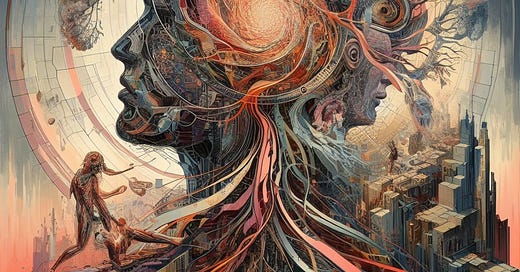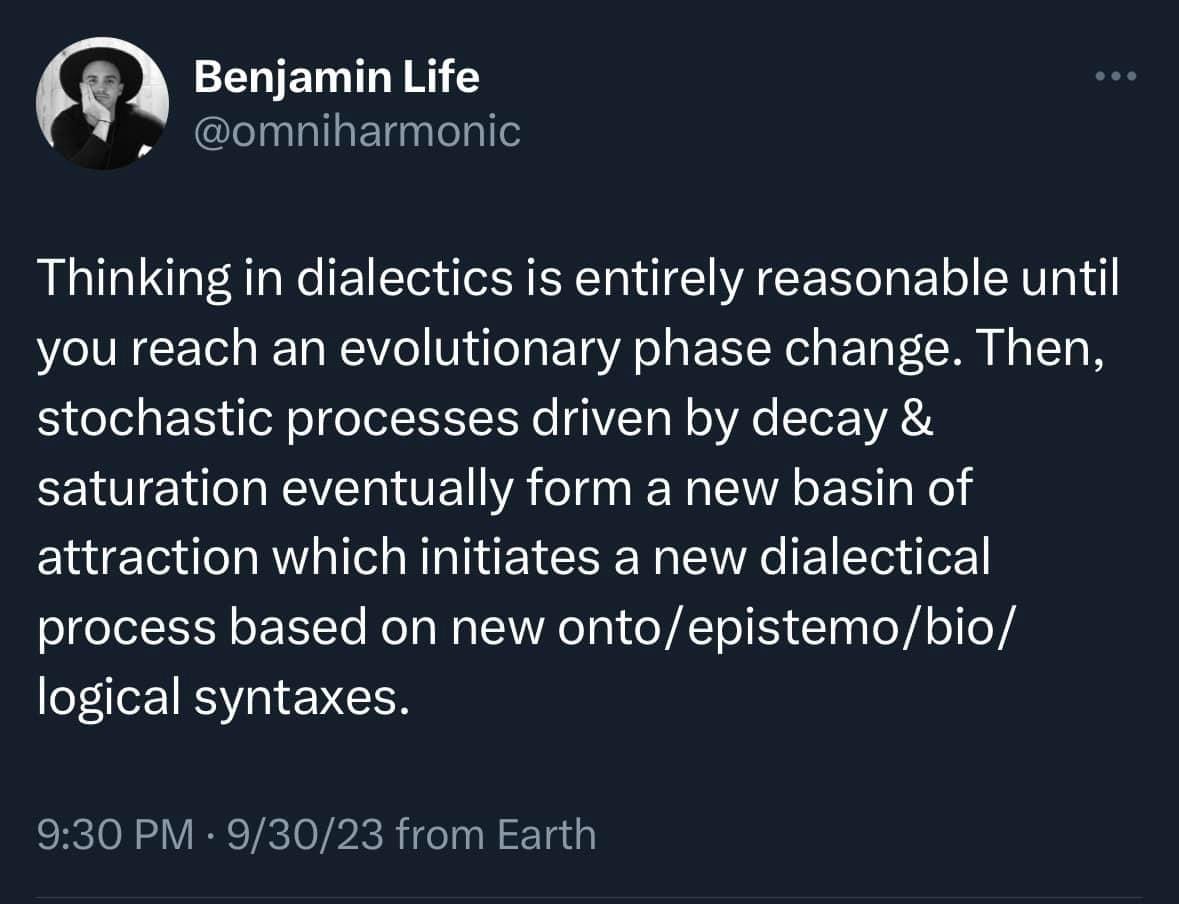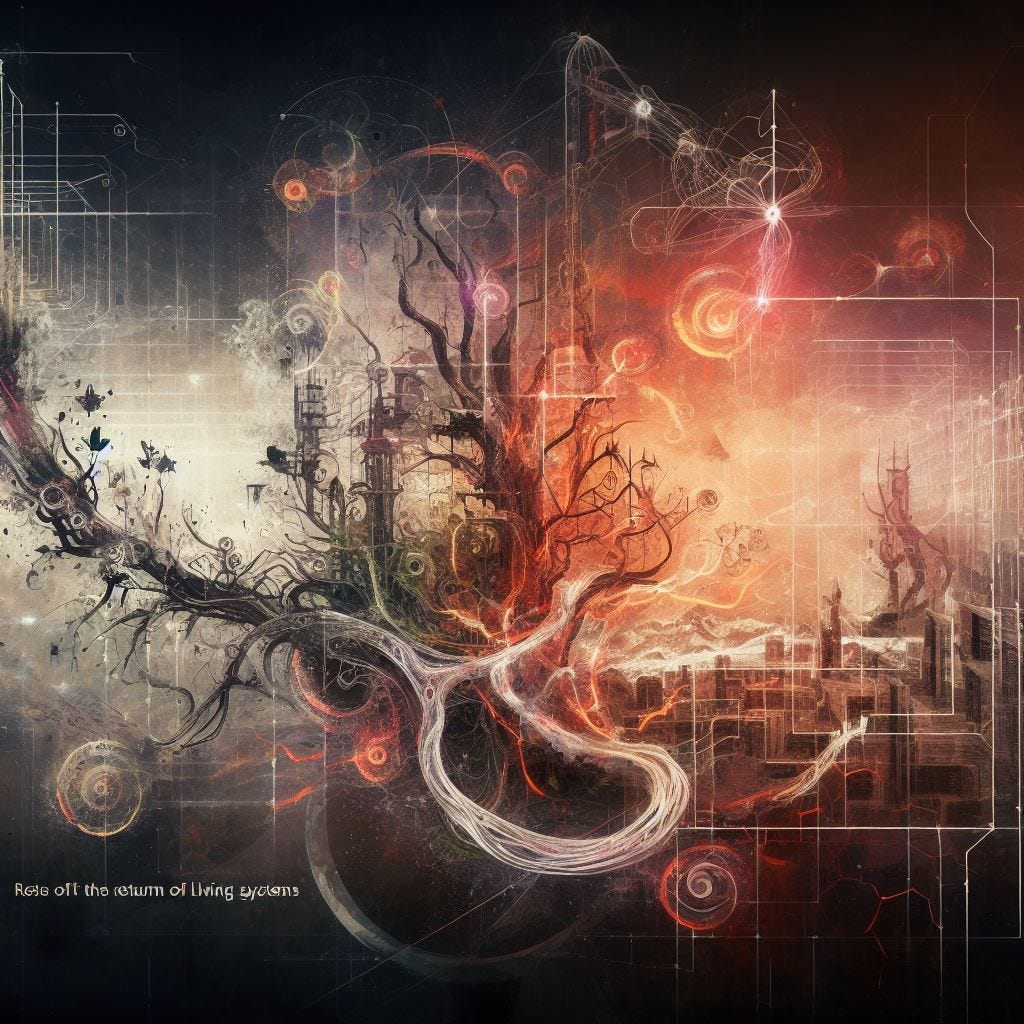Dialectics & Spontaneous Evolution
I use Twitter primarily as a scratchpad for ideas that I want to turn into essays. A recent Tweet stirred up many voices who suggested the concepts were difficult to parse out and understand which spurred me to write the following essay, expanding on the dense ideas embedded in this 280 character snippet.
The tweet in question reads:
First, let's start with an understanding of dialectics. Dialectics are a process of iterative development and change, primarily written about by Hegel. Hegel describes the three fold process of dialectics which begins with a thesis, a statement of a definition or an idea which has embedded within it its own contradictions. Those contradictions invite an antithesis. Hegel used a term in German, Aufheben, that doesn't actually have the same connotation of negation that is implied by the English word “antithesis” as the opposite of something. Hegel was more interested in the idea of sublation or overcoming the idea by preserving some aspect of the true portion of the original and then proposing a new thesis that overcomes those limitations.
The final stage of the dialectical process is a synthesis in which those two positions are reconciled into a new thesis. You can see this is a feedback loop, an ongoing iterative process that feeds back on itself. Dialectics as a philosophical theory also has relevance to the relationship between socio-cultural dynamics and material reality, which Karl Marx and Frederick Engels wrote about as dialectical materialism. They believed that the contradictions that Hegel referred to were actually embedded in the social and political structures of a particular society at a particular time. For example, the oppression of the peasants during Medieval times would lead to an antithesis that would then resolve in a new social structure, which defines the story of how we progressed from feudalism to monarchy to enlightenment democracy to capitalist democracy to late stage capitalism. All of these are expressions of a dialectic that has affected and transformed social structures over time. Communism is one another example of an antithesis position that arose during the early Industrial era and became its own thesis position in the Soviet Union and in Communist China.
There's something very natural about thinking in terms of dialectics that arises from the phenomenology of our time bound human experience. We are here, now, responding to what is in our given circumstance. And our response to those circumstances always changes the circumstances themselves. Very naturally, our being in the world gives rise to this process of iterative change.
But all dialectics start somewhere. While you can trace an unbroken chain of relationship between the world today and the origin of the Universe billions of years ago, spontaneous jumps in complexity and novelty define the pulses of this broader evolutionary process. These epochal moments define the possibility space of a given dialectic by inferring and embedding initial conditions and assumptions in the syntax or ordering principle that will be iterated upon as the process unfolds. These epochal moments could also be called evolutionary phase changes. In music theory these changes are equivalent to the jump from one octave to another. In biomaterial reality, this nonlinear change is equivalent to the jump from single to multicellular life, the first use of fire, the dawn of agriculture, and now, the dawn of the Internet and a planetary superorganism. Life’s pattern jumps to a new level of complexity and the iterative process begins again with a new set of orienting principles and underlying instructions for what the pattern is attempting to achieve within a landscape. Our maps of reality are forced to change dramatically as our understanding of our circumstances profoundly change.
Many of these insights come from the book Spontaneous Evolution by Bruce Lipton and the work of Samatha Sweetwater which describe the logic of evolution as it applies to both biology and culture. Lipton describes the jump from single to multicellular life through the idea of saturation. When a species saturates its possibility space, the logic it used to achieve that saturation bumps up against its own edges. What allowed the species to become dominant and proliferate into all the different niches it could occupy is now no longer sufficient to continue its survival. In this way, evolution creates the conditions of limitation to spur spontaneous jumps in complexity. In order to survive, the organism’s only option was to become multicellular, redefining the syntax of what an organism is and could be.
Similarly, human systems and culture are approaching saturation, having filled every biological and cultural niche we are capable of filling. Our species’ internal logic, the underlying syntax that has ordered meaning and society, that has been so relatively successful at feeding and housing and technologically connecting billions of humans is now degrading the substrate of living systems upon which that entire dialectical socio-cultural process relies. As such, another dialectical move in direct response to the contradictions of postmodernism (identity politics, self-referential focus on subjectivity) is insufficient to meet the scope and scale of our current epochal evolutionary phase change.
Dialectics are only ever building upon the thing that's come before them. Postmodernism is only really responding to the contradictions of modernism. Metamodernism is only really responding to the contradictions of postmodernism. When evolutionary phase changes occur, there's return to the substrate, a return to the natural laws of matter itself, and a deeper questioning of some of the assumptions that are baked into the dialectical process (ie what are the unquestioned assumptions embedded in every thesis, antithesis, and synthesis).
My argument is that the dialectical process of Western society is based on certain ontological, epistemic and biological assumptions. Ontological assumptions are assumptions about being itself, core definitions and frameworks that we use to interpret reality. The ontological frame of separation describes human beings as rational actors that are separate from one another. It sees the world as being made up of individuals that are attempting to maximize their own self interest. These ontological assumptions are baked into the entire dialectic of Western society, starting with the dawn of agriculture.
The development of our current epistemic dialectic is actually more recent. Epistemic philosophy is the human project of examining how we know what we know. The scientific, rational materialist worldview or epistemic philosophy emerged out of the tradition of alchemy, evolving into the early stages of the scientific method which were then reified during the Enlightenment and became the basis for the dominant Western culture’s way of knowing the world and knowing what we know about the world. Specifically, the use of hypothesis and controlled variable testing became the only way in which our society claims to know what it knows. This is more true for the hard sciences, but even in the social sciences this kind of epistemic framework became the dominant ideology.
Here is where we can see the decay of these fundamental assumptions. Despite massive advances in our understanding of biology and pharmacology, we are experiencing chronic illnesses at far higher rates than at any other time in human history. While we have prevented certain kinds of death and extended the human life expectancy by almost double our ancient ancestors, we are unable to create truly vital human health at scale. Despite the billions of dollars directed towards cancer research every year, our current epistemic framework has been unable to find a solution. This is due to the epistemic biases embedded into the scientific method which is only able to study material reality through controlled and isolated variables. As such, this epistemic framework is largely unable to provide any meaningful knowledge about complex adaptive systems like human and ecological health. Human and ecological health are largely based on the relationship between processes and organisms. To address cancer would require an epistemic shift that was willing to look at the complex relationships between industrial processes, agricultural processes, environmental processes, and human health. The inability of our current epistemic frameworks to address these challenges reveals a process of decay in which the core assumptions embedded within the dialectic of Western thought are proving insufficient at achieving their desired goals. As such, alternative medicine and alternative worldviews are proliferating that question many, but not all, of these core assumptions. This is only one example of dialectical decay. We now have a diverse body of direct evidence that contradicts not only the current thesis but the core assumptions of the dialectic itself.
Another way of describing these assumptions is by referring to them as a syntax. Syntax is basically a fundamental structure of language and meaning. We can see there’s a core underlying syntax across our understanding of biology, agriculture, and health which involves taking things apart into pieces and studying them as separate isolated components. Our entire culture and its dialectic process is informed by those underlying beliefs and rules about how meaning is produced. The story of separation is a syntax for how we order reality.
The scope and scale of the crises that we face are revealing the inadequacy of this syntax. The phase change we are currently experiencing is equivalent in scope and scale to the epoch-defining dawn of agriculture. The emergence of agriculture was a phase change, a jump in worldview, that was not a dialectical move from animistism into separation. It was a paradigm shift in human culture that created a whole new set of underlying assumptions that would inform the dialectic that followed.
These jumps inherently invoke a new syntax, a new way of ordering meaning by creating a new set of boundaries and a new sense of self, other, and world. These new boundaries, primarily the boundary of self, form a basin of attraction, a concept that comes from mathematics and complexity studies. A basin of attraction is a boundary that informs and is informed by what is possible within a set of constraints and initial conditions. You can think of a dialectic as an algorithm designed to explore the particular possibility space that is created by the boundaries of the syntax of culture. When a new syntax is created, it creates a new basin of attraction, a new set of boundaries in which dialectical exploration can occur according to a set of simple rules.
My argument is that the Western dialectic as a whole has reached a state of saturation and decay, meaning that we've utilized the story of separation to explore the entire possibility space created by the initial assumptions of that story. Human beings have colonized a vast portion of the planet. We've industrialized the consumption of nearly every type of resource. We’ve created a truly global supply chain that is able to move that resource around the planet at very fast speeds. In so doing, we're actually pushing up against the edges of the possibility space created by the syntax of the story of separation. This means that we've explored so much of the possibility space that we're now destroying the underlying ecosystemic health that makes this Human experiment possible.
Our ideologies and the dialectics of those ideologies are only really possible if we have a healthy planet and are in alignment with the continuity of Life. The destruction of the substrate of living systems is causing us to bump up against the edges of the carrying capacity of the Earth, importantly, within the context of that story of separation. If we endlessly consume and extract and and only pursue exponential growth in alignment with the internal logic of our dominant culture, we will effectively destroy ourselves. As this reality becomes more and more visible, the decay of the story of separation’s internal logic is starting to become pronounced. Fewer and fewer people believe that story is the fundamental story that describes reality.
And yet, Zizek famously said, “it is easier to imagine the end of the world than it is to imagine the end of capitalism.” This is how ontological assumptions are baked into dialectical processes. We believe that the constraints of the story of separation are descriptive of reality itself instead of understanding them as malleable social constructs. Even as the story of separation decays, most of humanity seems to be slouching into an internet-enabled nihilistic, fatalistic, deconstructive mood with no new horizon of an orienting principle that could redeem or recast or reconstruct the Human Project in a new story worth pursuing collectively as a civilization.
The dialectic that is currently happening amidst or in spite of the broader culture of nihilistic dissociation is producing multiple antithesis positions that are vying to create the new synthesis. Because of the peer-to-peer quality of the internet, many different antitheses are emerging. Some are going into neo-fascism or modernist, supremacist ideologies. Some are going into neo-indigenous, Vedic, or Buddhist worldviews. Some are going into the sincere-ironic worldview of metamodernism.
Integral theory and metamodernism worldviews do refer to a phase change and present themselves not merely as a dialectical move in response to postmodernism but as a jump into a so-called “tier 2” meta or integral perspective. And yet, the syntax of the previous stages of development is still embedded in the integral worldview as it perceives itself as above or transcendent without fundamentally addressing or integrating the biospiritual implications of returning to the substrate of living systems and natural law and redefining the core syntax that describes what a human being truly is.
I would argue that these dialectical moves are insufficient to respond to the scope and scale of the crises we face because the crises themselves are a product of the core assumptions in the underlying syntactical, ontological, and epistemic structures that we’re embedded within. I am arguing that we need to rewire human culture at a more fundamental level than simply a dialectic. I believe we need to go back to first principles of natural law to create a new syntax based in the story of interbeing which fundamentally changes the underlying assumptions that inform the dialectical process of human society.
The stochastic processes that I mentioned in the Tweet refer to going into the desert of the real, going into the mystery, going into the unknown. This is a deeply a shamanic process that we're undergoing collectively as a society. Charles Eisenstein refers to it as the fertile ground of bewilderment. In order for us to redefine the core assumptions of human society, we need to go mad. We need to let go completely of every meaning making structure that has gotten us here, and from that place of total dissolution, move into this the randomness of the interactions between ourselves and each other and the world without clear definition. Only a process that completely embraces the unknown can truly produce the emergent syntax of a new story. The emergent syntax of a new story creates a new basin of attraction, a possibility space in which we can collectively explore and evolve human society, human culture, and human experience with a different orienting principle of what human society is, and what is it's in service to. We can then begin to iterate through a new dialectical process with a different set of fundamental assumptions around what it means to be human.
I personally have a lot of ideas about what that syntax is and what the new dialectic should be in service to: optimizing for quality of life, increasing the complexity of biodiversity, and including a more pluralistic and less ideological orientation to meaning itself. I envision a human society and culture based more on first principles, grounded in a fundamental solidarity with and as Life itself, a return to the substrate of living systems as the fundamental orienting principle of our society. But regardless of my own personal sensing of this new story and its syntax, the main point I’m trying to make is that the most effective move to resolve the contradiction of our current predicament is not to participate a new dialectic turn, but to let go of the dialectical process entirely, submerge ourselves in the annihilation of the mystery itself, and, from that place, create a new grammar, a new syntax, a new set of fundamental orienting principles of meaning itself that enable a Life-centric society or a Life Culture to emerge.








